20 Years of Poland‘s Membership in the EU
Author: Beata Roguska
|
2024-04-26
The beginnings of the political transformation in Poland were accompanied by the call to "return to Europe". Very quickly it became specific in the demand for integration with European structures, first the EEC, then the EU. Already in February 1994, the European Agreement, signed in December 1991, entered into force, establishing Poland's association with the European Communities. Ten years later, on May 1, 2004, i.e. six years after the start of accession negotiations, Poland became a member of the European Union.
In recent years, we have recorded record high support for Poland's membership in the European Union. The acceptance of our country's membership in this organization sometimes even exceeded 90%. The results of this year's survey indicate a significant decline in support for membership: 77% of respondents are currently in favour of Poland's presence in the European Union, 8 points less than in April 2023 and 15 points less than in June 2022. Currently, 17% of respondents are against Polish presence in the EU, i.e. 7 points more than a year ago and 12 points more than two years ago. Poles' attitude towards EU membership is currently the least favourable since May 2013, when 72% of respondents supported membership in the EU, while the percentage of opponents reached 21%.
Attitude towards Poland's membership in the EU
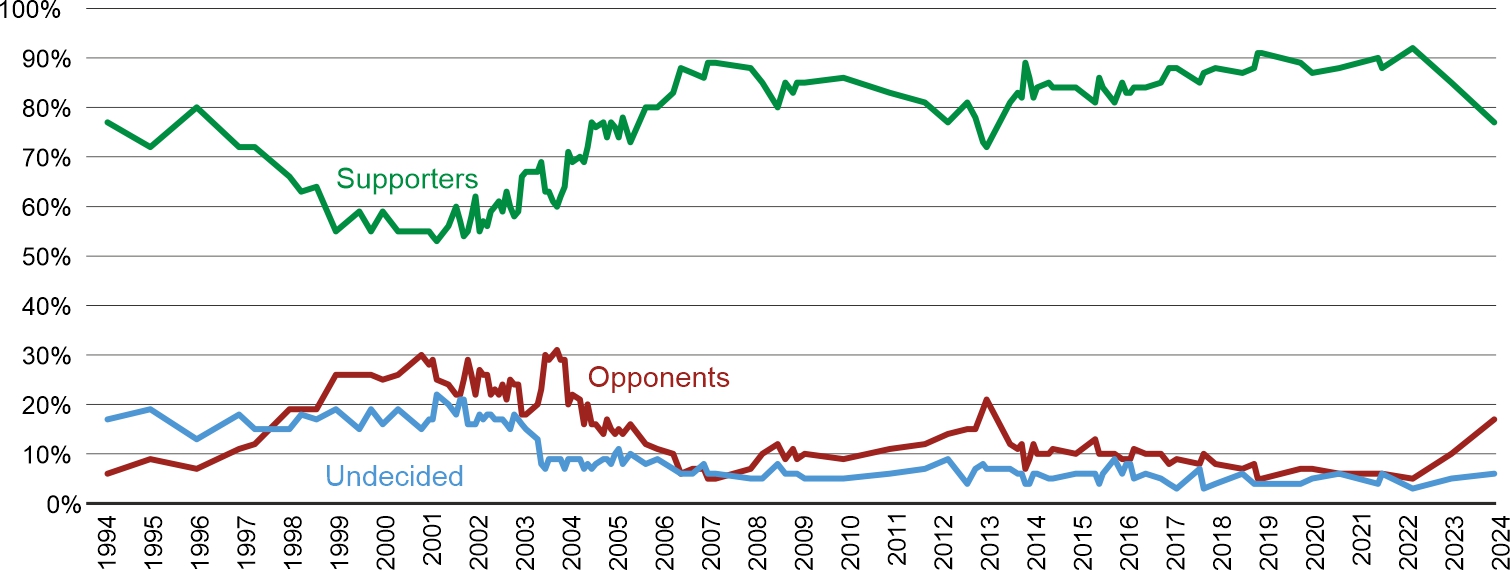
Supporters of Poland's membership in the European Union dominate in all socio-demographic groups included in the analyses. We have noted over 80% support for Poland's presence in the EU among the inhabitants of the largest cities, people with higher education, respondents with monthly income per capita of PLN 3,000 and up, among those who assess their financial situation well, among managers and specialists, company owners, and administrative and office workers, service workers and among respondents aged 55 to 64. Opponents of EU membership constitute more than one-fifth of the following groups: rural residents, people with primary/lower secondary education, respondents with monthly per capita income below PLN 2,000, people who assess their financial situation as bad, farmers, unskilled workers, pensioners, as well as middle staff and technicians. and young people aged 18 to 24.
Very high support for membership, exceeding 90%, is noted among the electorates of the parties in the ruling coalition. The majority of Law and Justice (PiS) supporters also accept our presence in the EU, although support for membership in this party's electorate is no longer as high as last year, when it reached over 80%. Over the last year, scepticism towards integration has clearly intensified in the electorate of the Confederation. Unlike a year ago, opponents of EU membership predominate among its supporters.
Attitude towards Poland's membership in the EU in party electorates:
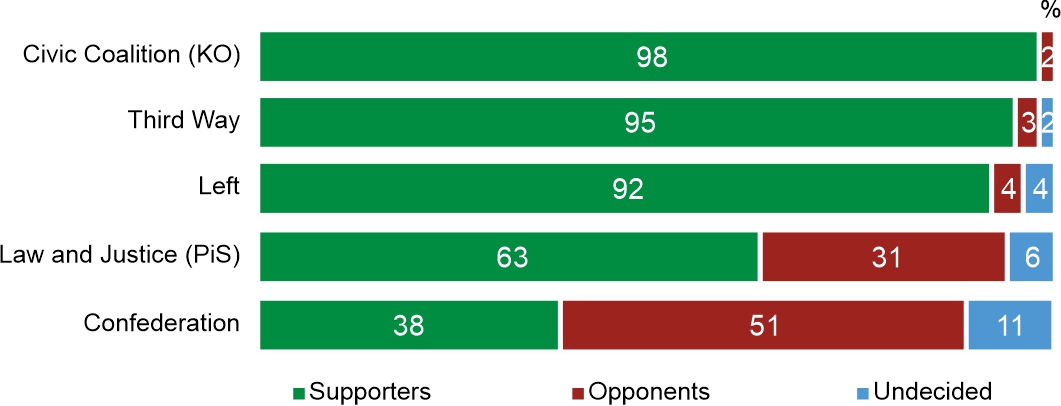
After 20 years of membership, public assessment of the overall balance of integration for Poland is rather positive. In total, 59% of respondents believe that Poland's presence in the EU brings more benefits to our country than losses. Slightly more than one-fifth (21%) think the opposite: that our country loses rather than gains from membership in the EU. The belief that the positive and negative effects of membership are equal is expressed by 15% of respondents.
The personal effects of membership are less clearly perceived. Nevertheless, also in this case, positive assessments predominate (50%). Nearly a quarter (24%) tend to believe that they personally gain as much as they lose from being in the EU, while 17% of respondents perceive losses rather than benefits related to membership in the EU.
We asked respondents a similar question about the perception of the effects of integration many times, initially asking them to assess the expected results of accession to the EU. The results of these studies show that the perceived effects of integration have, overall, been better than pre-accession predictions. In 2019, 15 years after accession, we recorded record-breaking good assessments of the effects of membership. At that time, as many as 78% of respondents declared satisfaction with the balance of integration for Poland. The belief that they personally benefitted from our presence in the EU was expressed by 57% of all respondents. This means that over the last 5 years, the percentage of people convinced of the positive consequences of membership on a national scale has decreased by as much as 19 percentage points (with an increase in the percentage of people negatively assessing the integration balance for Poland by 14 points).
The perception of the personal effects of integration has also deteriorated, although to a lesser extent: the percentage of the satisfied has decreased by 7 points, while the percentage of the dissatisfied has increased by 12 points.
Assessment of the effects of EU membership / integration for Poland
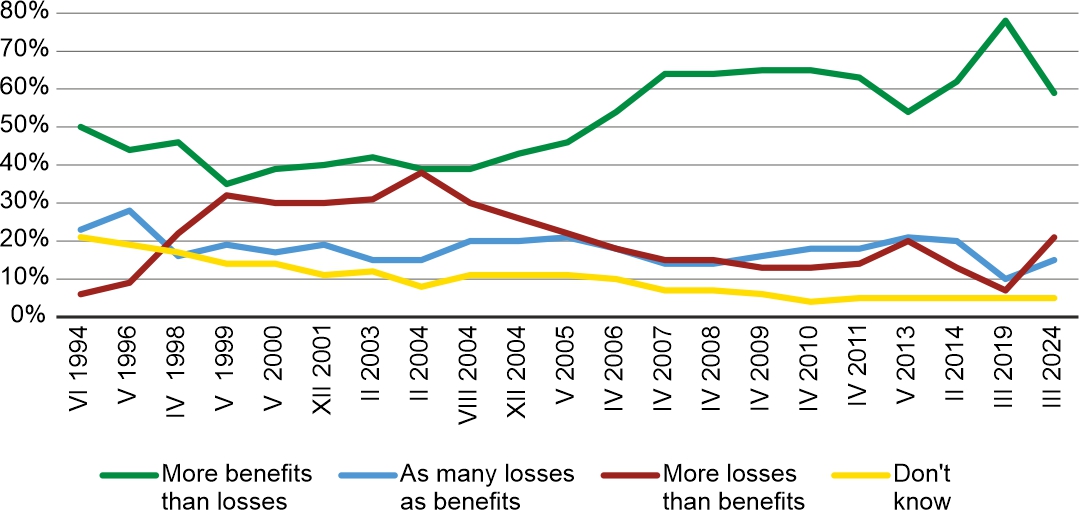
Assessment of the effects of EU membership / integration for the respondent personally
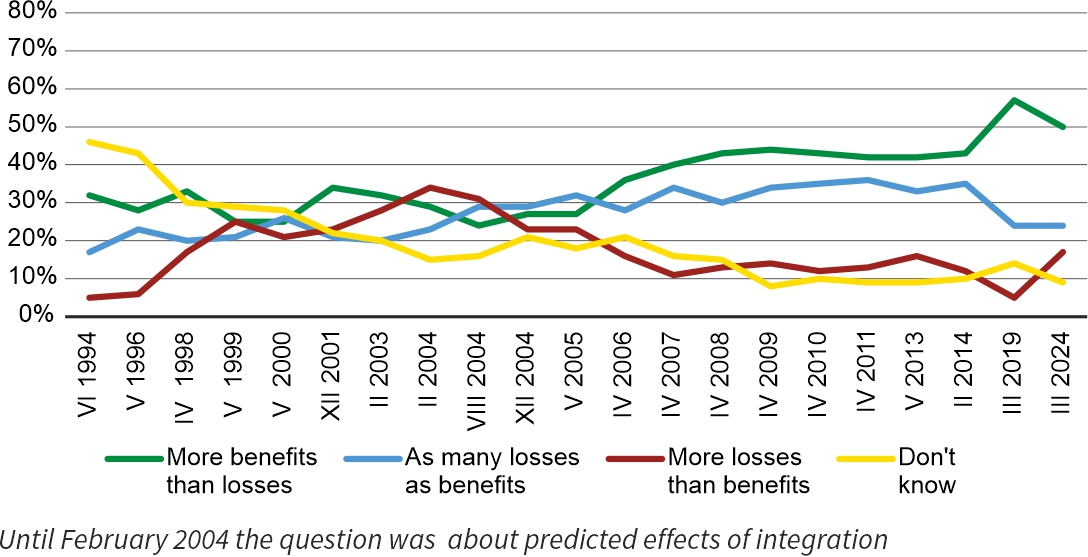
Five years after the previous survey on this topic, we again asked our respondents about the advantages and disadvantages of Poland's membership in the European Union. When describing the balance of integration, respondents did not use a ready-made selection of answers, but had the opportunity to formulate responses themselves. Like five years ago, the perceived advantages of Poland's membership in the EU most often are, on the one hand, obtaining and using EU funds, and, on the other hand, the benefits resulting from the opening of borders and freedoms related to the functioning of the common market. Respondents who point to financial benefits from integration most often talk generally about the inflow of money from EU funds, subsidies and projects financed or co-financed by the EU (28%). The effects of using EU money are noticeable primarily in investments in road infrastructure (5%) and in general in the development of the country, improving the infrastructure of cities and villages (6%).
The most frequently mentioned advantages of the EU membership included open borders and freedom of movement within the EU (in general, 22% of respondents mentioned this). The freedom of movement of workers and the possibility of working in other EU countries (7%) are still important in public perception. Respondents also emphasize the freedom to travel within the EU (7%). A large number of respondents point to the economic benefits associated with Poland's membership in the European Union: economic development, free movement of capital, but also (which we had not observed before) the economic security that the EU membership provides us with (12% in total). Respondents also invariably appreciate the development of trade in the EU due to the lack of customs barriers (9%). Sometimes they also emphasize the improvement in the standard of living after joining the EU (2%). In previous years, agriculture was the sector of the economy that was particularly frequently mentioned as benefiting from the membership. The perceived benefits for agriculture concerned mainly direct payments and other forms of subsidies for farmers and agricultural producers. Currently, Poles notice the positive effects of membership for farmers much less frequently (5%), which is understandable in the context of, among others, agricultural protests against EU policies, which enjoy quite widespread public support.
Due to the war in Ukraine, security has gained additional importance. Being a member of the European Union, Poland is safer than it would be if it had remained outside the EU. Respondents spoke about improving security and cooperation in the field of defence in the face of the threat from Russia (12%), but also generally about support from EU countries, mutual assistance, the strength of the alliance with the other states, etc. (6%). The remaining statements, more scattered, referred to, among others: joint action of EU countries, European identity, common values, the rule of law and its observance. Only 8% of respondents believe that Poland's membership in the European Union does not bring any benefits to our country, while 12% are unable to define them.
Respondents find it more difficult to determine the negative consequences of membership in the EU than its positive effects: 19% do not see any disadvantages of being in the EU, while 18% cannot name them. The perceived shortcomings related to the membership in the EU, as in previous years, focus on the need to adapt Polish law to EU law (15%), too detailed legal regulations (6%) and excessive limitation of Poland's sovereignty (21%). Additionally, the perceived lack of equality of the Member States, the domination of Germany and France in the European Union and the weak position of Poland, which has little impact on EU decisions (3%), are clearly mentioned. Areas where the introduced or planned restrictions are too great are clearly indicated: this mainly concerns environmental and climate protection issues (10%) and the related energy transformation (2%). Attention was drawn to the problems of agriculture related to excessive requirements regarding environment protection and the opening of the market for Ukrainian agricultural goods (5% in total). The excess of EU regulations in the economy, which limits the operation of the free market (3%), is also sometimes noted as a hindrance. Poles are also concerned about the influx of refugees and immigrants (3%), as well as cultural and moral changes perceived as a threat to Polish culture and customs, and to Polish national identity (2%).
The financial consequences of membership are occasionally raised - high contributions to the EU budget and the possible need to return money received from EU funds (3% in total).
As research results show, the perceived benefits of our country's membership in the EU mainly concern the possibility of obtaining EU funds, and on the other hand, they result from the opening of borders and participation in the common market. If we compare the importance of both of these factors for the development of Poland, it turns out that not only in the opinion of experts, but also in the public opinion, the possibility of participating in the common market based on the free movement of people, capital, goods and services is more important than the use of EU funds. Currently, 64% of respondents hold this opinion. This belief was also expressed in previously conducted research, starting from the first years after accession.
In your opinion, what is more important for Poland's development:
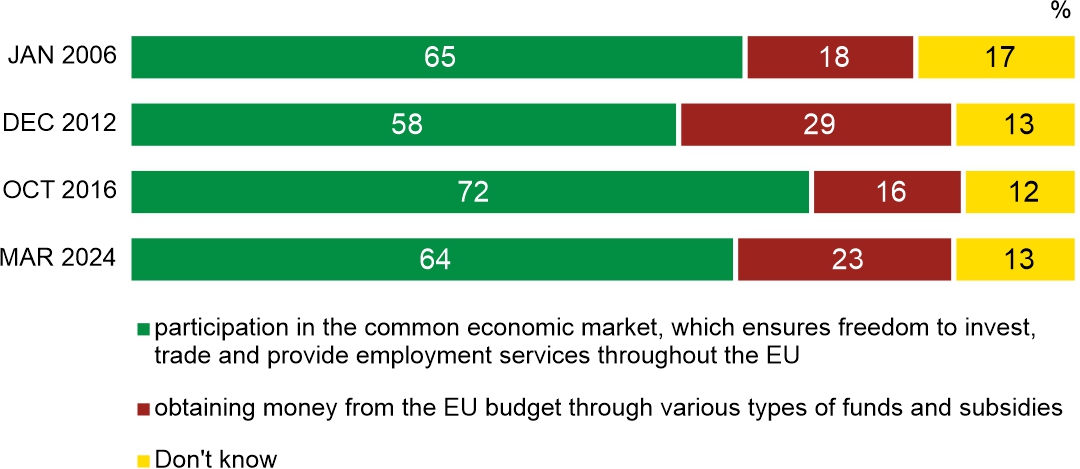
Everyone or almost everyone benefits indirectly from EU funds, e.g. as users of roads or other facilities co-financed from EU funds, but a large part of adult Poles are direct beneficiaries of EU funds. More than a quarter of respondents (29% in total) have used European Union funds through subsidies or participation in EU projects. Since 2016, the percentage of people making such declarations has increased by 12 percentage points.
Have you ever personally used EU money, e.g. have you received subsidies from the European Union or participated in EU projects?

Farmers stand out as beneficiaries of EU money, as nearly three-quarters of them (73%) currently receive funding, while a further 11% received it in the past. Business owners are also a distinctive group: in total, 43% declared having used EU funds (33% did so in the past).
This year's survey also contained questions about participation in selected types of activities, e.g. educational or sports, co-financed or fully financed by the European Union. The declarations show that a total of 29% of respondents have participated in this type of activity. This was most often mentioned by young people, primarily people up to 24 years of age (58% in total, including 43% who participated in this type of activities in the past), and especially students (67% of them in total, including 43% in the past, and 24% currently). Managers and specialists are also among those most likely to use EU-financed activities (60% of them have done so, including 43% in the past).
Have you ever participated in any activities, e.g. educational or sports, co-financed or fully financed by the European Union?

The possibility of shaping common policy in the European Union involves transferring some of the competences of nation states to EU bodies. Tightening integration therefore means limiting the sovereignty of member states (or pooling it) in many areas.
Which opinion is closer to your own view?
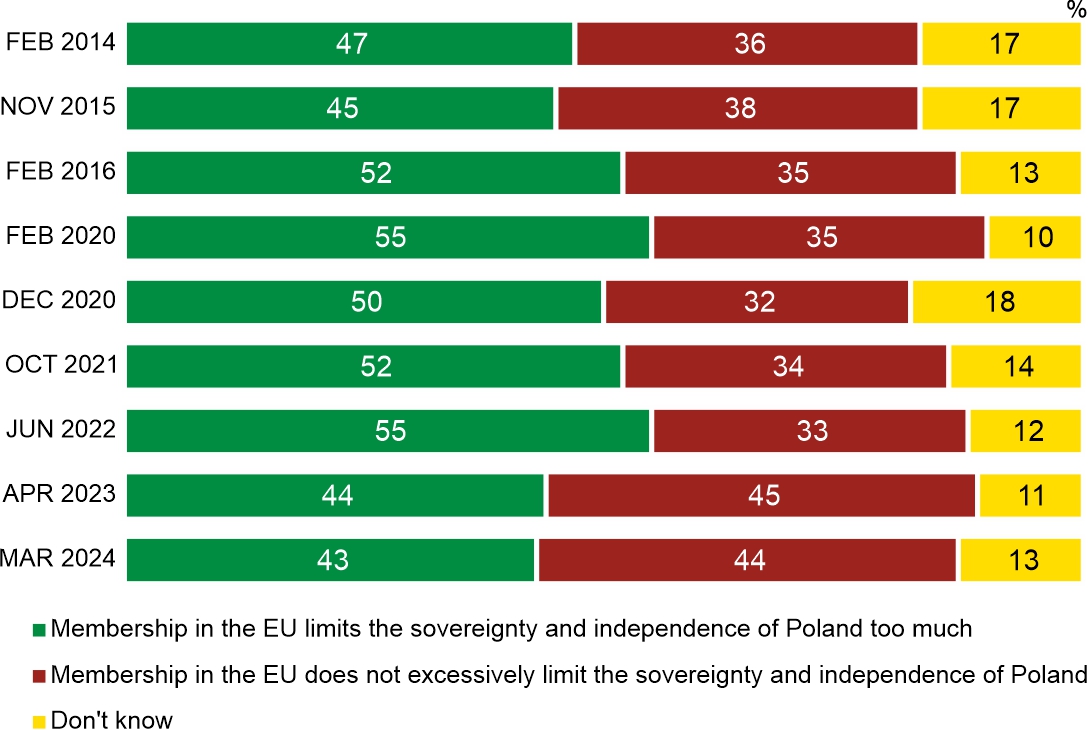
The answers to the question asked by CBOS since 2014 regarding the perception of our country's sovereignty indicate that a year ago there was an increase in the number of people who felt that membership in the EU excessively limits Poland's independence. Even then, it could be associated with the grain crisis related to the uncontrolled inflow of Ukrainian grain and other agricultural goods from Ukraine to Poland and dissatisfaction with the need to agree on decisions on this matter at the EU level. In surveys conducted until 2022, the percentage of people who thought that EU membership was not associated with excessive limitation of our country's sovereignty was higher than the percentage of people who held the opposite opinion. In 2023 both groups were about equal in numbers. Currently, like a year ago, approximately the same number of people believe that membership excessively violates Poland's sovereignty (44%) as believe that it does not (43%).
The view that membership in the EU excessively reduces Poland's sovereignty is widespread primarily among opponents of EU membership, but one-third of supporters also agree with it.
Which opinion is closer to your own view?
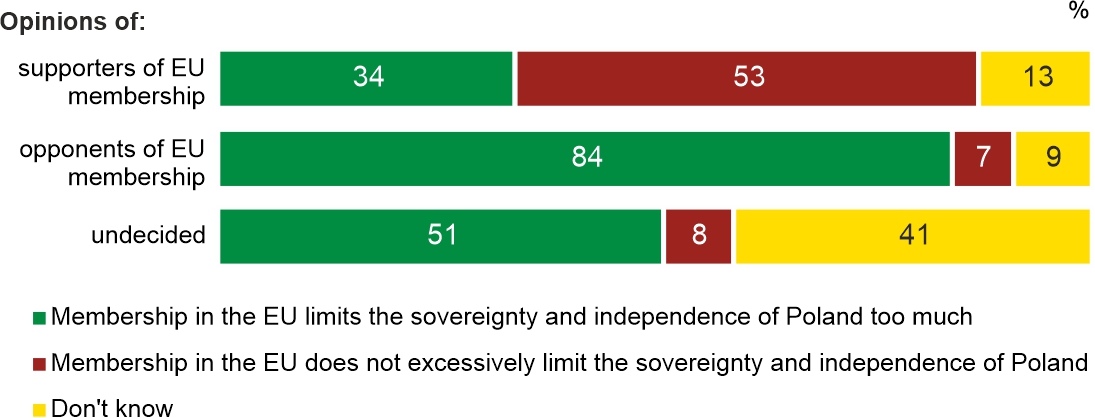
In total, 54% of respondents declared that they felt European, with European identity being secondary to national identity in the case of 50% of respondents, and occasionally considered more important (4%). On the other hand, 45% of all respondents consider themselves exclusively Polish. The results of this year's study are similar to those from two and a half years ago. From a longer time perspective, we can see a strengthening of identification with Europe; in studies carried out until 2014, people who felt European were a minority. In March 2019, for the first time, more than half of respondents described themselves as also or, occasionally, exclusively European.
Do you consider yourself as…
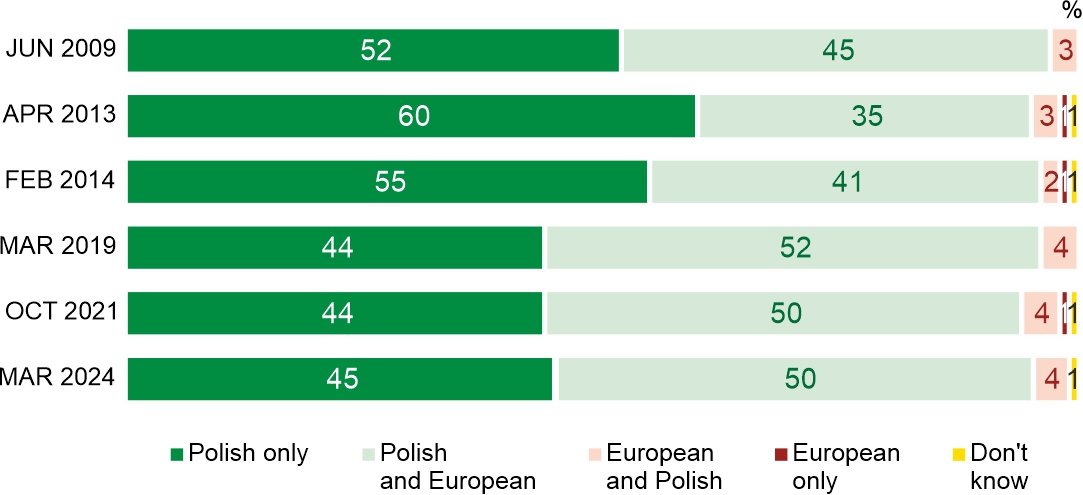
More information about this topic can be found in CBOS report in Polish: “20 years of Poland's membership in the European Union", April 2024. Fieldwork dates for the sample: March 2024, N=1089, mixed-mode interviews. The random sample is representative for adult population of Poland.




